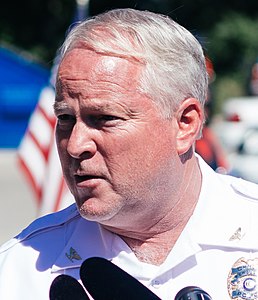Thomas Jackson (police chief, Ferguson, MO)
| Thomas Jackson | |
|---|---|

| |
| Occupation | Chief of Police |
| Salary | $100,000 in 204 |
Thomas Jackson is a former police officer.[1][2] He was the Chief of Police of Ferguson, Missouri when one of his officers, Darren Wilson, killed an 18 year-old black man, Michael Brown, on August 9, 2014. He had been Chief since 2010. His department included 54 police officers.
The killing triggered outrage, and protests.[1][2] Jackson's response to community outrage was seen as heavy-handed, as it included tear gas and riot squads. Jackson resigned after a scathing report from the US Department of Justice criticized systemic racism within his department. His was the sixth resignation after the killing.
Jackson published a book about the incident, in July 2017, entitled “Policing Ferguson, Policing America: What Really Happened — and What the Country Can Learn From It.”[3] Primary premises of the book include the assertion that officer Wilson was justified to use deadly force, and he did so in an appropriate manner; and that Wilson, Jackson himself, and all other local policemen, were unfairly demonized by a hostile and irresponsible press.[4][5] He was critical of Attorney General Eric Holder, who he argued, lead a premature rush to judgement.
According to a review in Publisher's Weekly Jackson book "adds little clarity".[6]
In An Exploration of Trust in Community Leadership Contexts the authors quoted Jackson's acknowledgment that he had no training for many of the roles he found himself called upon to perform[7]:
|
References
- ↑ 1.0 1.1 Ferguson police Chief Thomas Jackson resigns after scathing report, CBC News, 2015-03-11. Retrieved on 2022-07-19. “The resignation of Chief Thomas Jackson was the latest in a string of departures since the Justice Department said on March 4 that a months-long probe had uncovered a range of unlawful and unconstitutional practices in the St. Louis suburb.”
- ↑ 2.0 2.1 Ferguson: Key figures in the Michael Brown case, CTV News. Retrieved on 2022-07-19. “Thomas Jackson was a police veteran long before he came to Ferguson. He spent more than 30 years with the St. Louis County Police Department, at one point serving as commander of a drug task force. Before that he was a SWAT team supervisor, undercover detective and hostage negotiator.”
- ↑ Harry Levins. Ex-police chief tells his own side of Ferguson shooting, St. Louis Post-Dispatch, 2017-07-29. Retrieved on 2022-07-19. “Jackson has written a book that swerves from anger at what he sees as unfair condemnation of his police force to some well-reasoned thoughts on how police departments and communities can get along better.” mirror
- ↑ Stacey Vanek Smith. 'Policing Ferguson, Policing America': The Unrest Over The Death Of Michael Brown, National Public Radio, 2017-08-06. Retrieved on 2022-07-20. “And, by the way, the politicians just threw the police under the bus right away. So they criticized us for using tear gas, but when you've got a violent crowd that's - where people are shooting guns, throwing rocks and urine and things like that, that's a deadly force situation for everybody. And tear gas is the safest way to disperse a crowd without hurting anybody. The other choices, you know, being nightsticks and things.”
- ↑ Policing Ferguson, Policing America: What Really Happened—and What the Country Can Learn from It, Storytel, 2022-05-16. Retrieved on 2022-07-20. (in Arabic) “Following the fatal shooting in broad daylight of unarmed African American Michael Brown by a white cop in August 2014, Ferguson, Missouri became the scene of protests that pitted police against locals and Black Lives Matter.”
- ↑ Policing Ferguson, Policing America: What Really Happened—and What the Country Can Learn from It, Publisher's Weekly. Retrieved on 2022-07-20. “He firmly believes that his department was defamed by the unruly media and a biased federal investigation. Although the FBI concluded that the shooting was justified, the Justice Department’s review of the Ferguson police force under Jackson’s leadership found a pattern of unconstitutional conduct aimed at the city’s African-American population.”
- ↑ 7.0 7.1 Richard Hudanick, Kimberlie M. Straatmann, Michael Miller, Andrea Harper, Joshua White (2019-05-25). An Exploration of Trust in Community Leadership Contexts. University of Missouri. Retrieved on 2022-07-20.